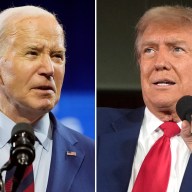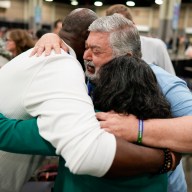‘American Sniper’ Since “Unforgiven” — and arguably even as early as the first film he directed, the proto-“Fatal Attraction” shocker “Play Misty for Me” — Clint Eastwood has been deconstructing his onscreen persona and all the questionable vigilante business it represents. This makes him the perfect person to handle “American Sniper,” the story of late noted Navy SEAL* sharpshooter Chris Kyle. This is a deeply, productively conflicted film. On one hand it’s a celebration of the troops. But that’s not the same as being a celebration of war, and it’s definitely not the same as being an uncritical look at what battle does to those who fight it. This is essentially Eastwood’s version of “The Hurt Locker”: a character study masquerading as a war film, and one that reaches about the same conclusion. Played as a taciturn block of granite by a bulked-up Bradley Cooper, Chris is a man prepped for war by his man’s man daddy, driven into the service when he spies 9/11 on the TV set. He winds up doing four tours during the wars in Afghanistan and Iraq, much to the consternation of his wife, Taya (Sienna Miller), an independent-minded sparkplug reduced over the years into a frustrated, crying, nagging (but ultimately supportive) wife. She has a good case against him, though: Chris, when he returns, is remote-bordering-on-scary, hollowed out by experiences no one should have. “American Sniper” is a bit more optimistic than “The Hurt Locker,” which posited that those who are best at war may be unable to do anything else. The back and forth between war and home can be repetitive, and one scene of Taya scolding Chris is like any other. (It’s important to note that, in part thanks to Miller, she really does start out as a charismatic character with her own inner life and decent prickly-romantic banter dialogue. It’s heartbreaking watching the character flattened out.) But the battle scenes are sly and complex. This is no rah-rah chunk of jingoism, wrapped inside an American flag and carried by a bald eagle. It begins with our badass debating whether to shoot a woman and her young son, who may be wielding weapons. Eastwood likes to play with our expectations and bloodlust. Whenever it shows fighting, the cuts become faster, the camera zooms in and out, the music storms with deafening percussion. (Eastwood, a normally laconic director, seems to have farmed these sequences out to someone else.) Everything about the aesthetics try to get us goosed up — except that the battles invariably feature either tragedy or trauma. No kill comes easily. Chris even has a rival sniper on the other side, both spending much of the film trying to take out the other. But we never much see, much less get to know, this guy, and when Chris finally bags him the moment is both anticlimactic and foolishly destructive, putting everyone in harm’s way just so our hero can get his man. Chris himself isn’t a braggart; he’s quiet and modest, getting deeply uncomfortable when people congratulate him on his record number of kills. A key scene finds him confronted by a man who wishes to thank him, deep down, and for what seems like forever, for actions that resulting in his life being saved. Cooper’s Chris can’t even look him in the eye and can’t wait to get out of there. The real life Chris Kyle seems to have been more volatile, with a red cross tattooed on his arm, as though he was in the Crusades; he was prone to statements like, “I don’t shoot people with Korans. I’d like to, but I don’t.” Any Islamophobia has been sanded down to nothing; he’s merely a good soldier going wherever he’s ordered. Cooper’s carefully modulated performance suggests darker inner demons that he would never articulate; Chris will spout off jargon about defending America and protecting his brothers, but Cooper telegraphs that not even he believes it. A dangerous, destructive (and self-destructive) vibe remains. It’s another of Eastwood’s wrestles with his own mystique, told by someone who knows what he’s talking about. That said, defending the stiffness of the film’s odd final scene may require more than auteurism. * Note: This piece mistakenly identified Kyle as being a member of the Army.
Follow Matt Prigge on Twitter @mattprigge
Director: Clint Eastwood
Stars: Bradley Cooper, Sienna Miller
Rating: R
3 (out of 5) Globes

















